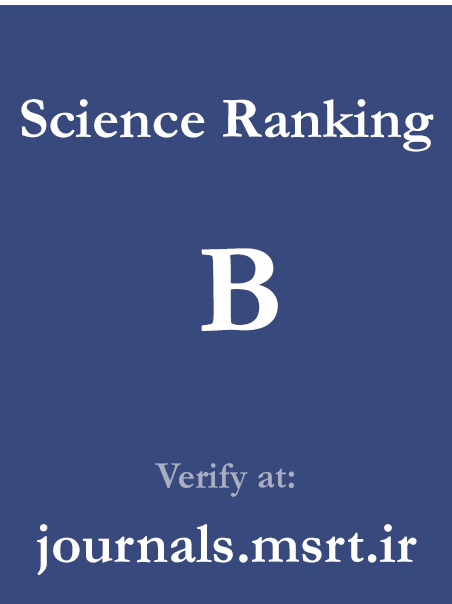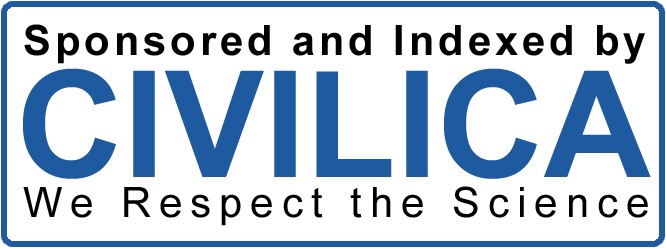Designing a Resilient Schools Model Based on the Grounded Theory
Keywords:
Resilience, Resilient Schools, Non-Governmental Schools, Secondary School StudentsAbstract
The present study was conducted with the aim of designing a resilient schools model based on grounded theory. In terms of purpose, this study is applied; in terms of data type, it is mixed of the exploratory type; and in terms of nature and implementation method, it was carried out in two ways: systematic grounded theory and cross-sectional survey. The qualitative section participants consisted of experts, including university professors and senior managers of the Ministry of Education, who were sampled using a purposive approach and the snowball method until theoretical saturation was reached, and interviews were conducted with 14 individuals. The quantitative population consisted of all heads and deputies of the educational districts in Tehran, totaling 622 individuals, of whom, based on the Morgan and Krejcie table, 242 were selected as the sample size through stratified random sampling. Qualitative data were collected in the field using semi-structured interviews, and quantitative data were collected in the field using a researcher-made questionnaire. The validity of the qualitative section instrument was determined using the retest of the work procedure and the inclusion of new interviewees, and reliability was determined using the inter-coder reliability test. The validity of the quantitative instrument was assessed through face and content validity (CVR), and its reliability was measured using Cronbach’s alpha coefficient. Qualitative data were analyzed using the theoretical coding method, and quantitative data were analyzed using confirmatory factor analysis. The results indicated that the resilient schools model based on systematic grounded theory includes 22 components and 97 indicators within six dimensions of the paradigm model, as follows: the core phenomenon with three components (flexibility in capital, adaptation to continuous changes, integrated internal and external support) and 10 indicators; causal conditions with three components (resilient characteristics of students and teachers, educational content and curriculum, school leaders) and 21 indicators; contextual conditions with three components (environment, school, family) and 10 indicators; intervening conditions with three components (motivational factors, spiritual factors, organizational factors) and 12 indicators; strategies with seven components (positive communication skills between teacher and student, teaching emotional-social skills, applying cooperative learning strategies, fostering positive emotions, developing students’ strengths, creating a sense of meaning and purpose, teaching cognitive skills) and 30 indicators; and consequences with three components (improving school efficiency, student success, enhancing quality of education) and 13 indicators. Ultimately, the validity of the model, its dimensions, components, and indicators obtained in the qualitative stage was confirmed in the quantitative stage, and statistical indices confirmed the fitness of the resilient schools structural model. As a result, policymakers and stakeholders in the education system can, by applying the findings of the present study and planning to remove obstacles, take steps toward creating and strengthening resilient schools, thereby yielding positive results and outcomes for the country’s education system and the future builders of society.
Downloads
References
1. Borazon EQ, Chuang HH. Resilience in educational system: A systematic review and directions for future research. International Journal of Educational Development. 2023;99:1. doi: 10.1016/j.ijedudev.2023.102761.
2. Skinner E, Graham JP, Brule H, Rickert N, Kindermann T. I get knocked down but I get up again: Integrative frameworks for studying the development of motivational resilience in school. International Journal of Behavioral Development. 2020:1. doi: 10.1177/0165025420924122.
3. Duchek S, Raetze S, Scheuch I. The role of diversity in organizational resilience: a theoretical framework. Business Research. 2019:1-37. doi: 10.1007/s40685-019-0084-8.
4. Béné C. Resilience of local food systems and links to food security-A review of some important concepts in the context of COVID-19 and other shocks. Food Security. 2020:1-18. doi: 10.1007/s12571-020-01076-1.
5. Lynch K. Education system resilience: Moving beyond buzzwords. GPE Transforming Education. 2024:1.
6. Teig N, Veletic J, Price H, Moore R, Ye W. Navigating resilient schools: examining principals' characteristics and leadership practices in eleven countries. 2024. doi: 10.54676/JZEG2765.
7. Kaim A, Siman-Tov M, Adini B, Lev-ari S. An innovative tool to assess the functional resilience of a school system: learning from the COVID-19 pandemic. Frontiers in Psychology. 2023;14:1291621. doi: 10.3389/fpsyg.2023.1291621.
8. Parajuli RR, Agarwal J, Xanthou M, Sextos AG, editors. Resilience of educational communities in developing countries: A Multi-Disciplinary Approach. The 17th World Conference on Earthquake Engineering; 2020; Sendai, Japan.
9. Agarwal J, Parajuli R, Xanthou M, Sextos A. Safer and resilient schools in seismic regions: a systems perspective. Civil Engineering and Environmental Systems. 2024;40(3):129-49. doi: 10.1080/10286608.2023.2289568.
10. Kara B, Morris R, Brown A, Wigglesworth P, Kania A, Hart J, et al. Bounce forward: A school-based prevention programme for building resilience in a socioeconomically disadvantaged context. Frontiers in Psychiatry. 2021;11:Article 599669. doi: 10.3389/fpsyt.2020.599669.
11. Abram MJW. Resilience and burnout in healthcare students and inpatient psychiatric nurses: A between-groups study of two populations. Archives of Psychiatric Nursing. 2021;35:1-8. doi: 10.1016/j.apnu.2020.10.008.
12. Heydari M, Tabarsa G, Sheikh Al-Islami Kandleh N. Designing a Resilience Model in Government Organizations of Kermanshah Province. Management and Educational Perspective. 2023;3(17):100-23.
13. Burnard K, Bhamra R, Tsinopoulos C. Building organizational resilience: four configurations. IEEE Transactions on Engineering Management. 2018:1-42. doi: 10.1109/TEM.2018.2796181.
14. Rai SS, Rai S, Singh NK. Organizational resilience and social-economic sustainability: COVID-19 perspective. Environment, Development and Sustainability. 2021:1-18. doi: 10.1007/s10668-020-01154-6.
15. Sher L. Resilience as a focus of suicide research and prevention. Acta Psychiatrica Scandinavica. 2019;140(2):169-80. doi: 10.1111/acps.13059.
16. Kiswarday V, Koper S. Empowering resilience within the school context. Metodički obzori. 2012;7(1):93-103. doi: 10.32728/mo.07.1.2012.07.
17. Afzali L, Hosseinian S, Naghl Z. Identifying Contextual Components in Resilient Schools: A Systematic Review. Journal of Applied Psychological Research. 2023;14(1):15-30.
18. Novini Khoshno M, Latifi M, Asfarpour Vakilian M. Designing and Explaining a Resilience Model for Employees in Urban Crisis Management Departments Using Qualitative Grounded Theory (Case Study: Hamadan City). Political Sociology of Iran. 2022;5(10):3382-402.
19. Khodayari Z, Kavyani E, Lai S, Eslam Panah M. Identifying and Prioritizing Components of Resilient Schools with Emphasis on Students' Academic Performance. Studies in Adolescent and Youth Psychology. 2022;3(6):363-75. doi: 10.61838/kman.jayps.3.3.27.
20. Bagheri M, Sadeghi M, Abolghasemi M, Fazlollahi Qomashi S. A Qualitative Model of Resilience for Primary School Principals Based on Experts' Perspectives. A New Approach in Educational Management. 2022;13(5):17-28.
21. Hosseini Mard Z, Asgarnejad Fard AA, Taheri A. Developing a Structural Model of Student Happiness Based on Resilience, Self-Esteem, and School Satisfaction with the Mediation of Self-Efficacy. Sociology of Education. 2024;10(1):107-18.
22. Sanaei F, Jazayeri Ra-S, Fatehizadeh M. Developing an Educational Model for Student Resilience Based on the Lived Experiences of Resilient Students: A Qualitative Study. Clinical Psychology Studies. 2023;13(52):77-116.
23. Shaw RJ, Currie DB, Smith GS, Brown J, Smith DJ, Inchley JC. Do social support and eating family meals together play a role in promoting resilience to bullying and cyberbullying in Scottish school children? SSM - Population Health. 2019;9:1-9. doi: 10.1016/j.ssmph.2019.100485.
24. Llistosella M, Castellví P, García-Ortiz M, López-Hita G, Torné C, Ortiz R, et al. Effectiveness of a resilience school-based intervention in adolescents at risk: a cluster-randomized controlled trial. Frontiers in Psychology. 2024;15:1478424. doi: 10.3389/fpsyg.2024.1478424.
25. Ambelu A, Mulu T, Seyoum A, Ayalew L, Hildrew S. Resilience dynamics after interventions made among school children of rural Ethiopia. Heliyon. 2019;5:1-22. doi: 10.1016/j.heliyon.2019.e01464.
26. Pinskaya M, Kosaretsky S, Zvyagintsev R, Derbishire N. Building resilient schools in Russia: effective policy strategies. School Leadership & Management. 2019;39(2):127-44. doi: 10.1080/13632434.2018.1470501.
27. Ledger S, MacCallum J, Boadu G. Resilience and wellbeing within schools: contradictions and silences in global policy texts. Educational Review. 2024. doi: 10.1080/00131911.2024.2392585.
28. Asadi A, Tootian S. Designing a Resilience Model for Human Resources with an Organizational Culture Approach within the Framework of General Policies of the Administrative System. Strategic and Macro Policies. 2024;12(2):340-64.
29. Aghaei Khani M, Azadedel MR, Ganjinia H. Designing a Measurement Model for Resilience in Government Organizations Based on Deductive Reasoning and Fuzzy Rules. Development and Transformation Management. 2024;57:1-22.
30. Silavi E, Amirkhani AH, Gholamrezaei D, Darvish H. Designing a Human Resource Resilience Model in the Context of the Corona Crisis. Outlook on Public Management. 2023;14(3):61-87.
31. Seiler A, Jenewein J. Resilience in cancer patients. Frontiers in Psychiatry. 2019;10:208. doi: 10.3389/fpsyt.2019.00208.
32. González C, Inglés CJ, Kearney CA, Sanmartín R, Vicent M, García-Fernández JM. Relationship between school refusal behavior and social functioning: a cluster analysis approach. European Journal of Education and Psychology. 2019;12(1):17-29. doi: 10.30552/ejep.v12i1.238.
33. De Feyter JJ, Parada MD, Hartman SC, Curby TW, Winsler A. The early academic resilience of children from low-income, immigrant families. Early Childhood Research Quarterly. 2020;51:446-61. doi: 10.1016/j.ecresq.2020.01.001.
34. Aldianto L, Anggadwita G, Permatasari A, Mirzanti IR, Williamson IO. Toward a Business Resilience Framework for Startups. Sustainability. 2021;13(6):1-19. doi: 10.3390/su13063132.
35. Dahles H, Susilowati TP. Business resilience in times of growth and crisis. Annals of Tourism Research. 2015;51:34-50. doi: 10.1016/j.annals.2015.01.002.
36. Purwanti L, Hapsari R. Analyzing the Role of Business Resilience as SME's Core Competence to Improve Business Performance on Pandemic Crisis: A Study on Indonesian' SMEs. Advances in Economics, Business and Management Research. 2022;206:276-84. doi: 10.2991/aebmr.k.220128.036.
Downloads
Published
Submitted
Revised
Accepted
Issue
Section
License
Copyright (c) 2025 Aydin Demanian, Hamid Shafizadeh, Fakhredin Ahmadi (Author)

This work is licensed under a Creative Commons Attribution-NonCommercial 4.0 International License.




